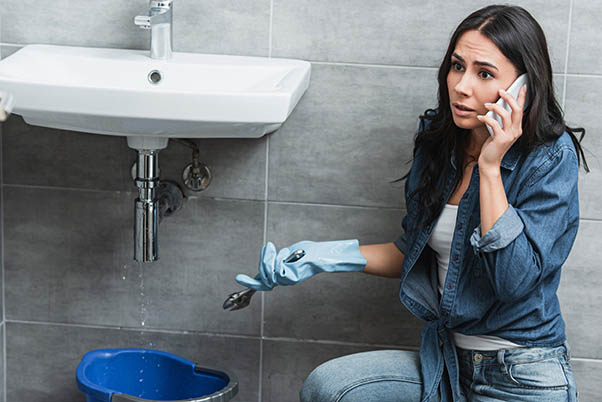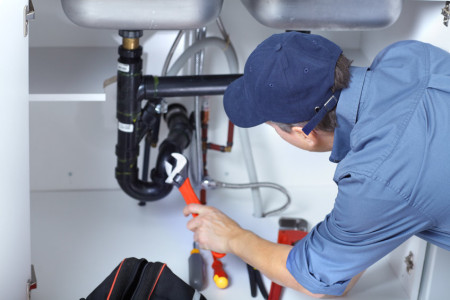How do you feel in regards to Expert Tips for Emergency Plumbing Repairs?

Pipes emergency situations can strike any time, creating stress and anxiety and prospective damage to your home. Whether it's a burst pipe, a clogged drainpipe, or a dripping tap, recognizing exactly how to handle the scenario till a specialist plumbing professional gets here can conserve you from more difficulties. This write-up gives essential emergency pipes pointers to aid you minimize damages and reclaim control throughout a pipes dilemma.
Turn Off the Supply Of Water
The initial step in any type of plumbing emergency is to turn off the supply of water. For local problems, such as a dripping tap or bathroom, shut off the shutoff near the component. When it comes to a significant leakage or ruptured pipeline, find your home's primary water shut-off valve and turn it off immediately. Knowing the location of these valves beforehand can conserve beneficial time throughout an emergency situation.
Shut down Your Hot Water Heater
In specific emergencies, such as a burst pipe, it's important to turn off your hot water heater. This stops getting too hot or damages to the device when water quits moving. Switch off the power supply to the hot water heater (electrical or gas) and allow it cool to stay clear of possible threats.
Momentarily Quit a Ruptured Pipeline
A ruptured pipeline can cause considerable water damages in mins. To alleviate the problem:
Call a specialist plumbing technician promptly to attend to the problem completely.
Have an Emergency Situation Pipes Package
Prepare a standard pipes emergency situation set to manage small problems successfully. Your set ought to include:
Having these devices available can make a considerable difference in your capacity to handle emergencies.
Unclog Drains Securely.
A clogged drain can be an irritating and messy problem. Here's just how to tackle it:.
If these techniques don't function, prevent using too much pressure, as it may intensify the blockage.
Handle Overflowing Toilets.
An overflowing commode can trigger immediate disorder. Right here's what you should do:.
Address Tiny Leaks with Short-lived Fixes.
Tiny leaks can swiftly become considerable troubles if left unattended. Make use of these short-term solutions until expert aid arrives:.
While these fixes aren't long-term, they can aid minimize water loss and damage.
Manage Frozen Pipes Thoroughly.
In chillier environments, icy pipelines are an usual emergency. If you presume a frozen pipe:.
Know When to Call a Specialist.
While quick fixes can help temporarily, certain plumbing problems need prompt specialist focus. Call a plumber if:.
Promptly contacting a professional ensures the issue is dealt with correctly and prevents further complications.
Protect against More Damages.
Taking fast activity to lessen damage can save you money and time in the future. Right here's how:.
Final thought.
Plumbing emergency situations can be frustrating, however with the best knowledge and devices, you can handle the situation effectively till assistance arrives. By switching off the water system, dealing with small leakages, and utilizing temporary solutions, you can lessen damage and maintain your home safe. Keep in mind, these tips are short-lived options; always get in touch with an accredited plumber to take care of the source of the problem. Prep work and quick reasoning are your finest allies in any kind of plumbing emergency.
8 Helpful Tips for Managing Plumbing Emergencies at Home
If your plumbing system hasn’t failed once, wait for it because almost everyone has a story to tell. Sometimes, it could be simple emergencies such as a leaking pipe, a blocked cistern, or even a big burst pipe. In situations like this, you need to have some handy tips to save you some money and from possible damages.
Take care of minor issues early.
Sometimes, you could have avoided an emergency by taking proactive measures while it was still early. Some major plumbing emergencies can be a result of an ignored minor issue. We recommend that you have items like plumbing tapes and other related items. A plumbing tape can allow you to manage minor leaks before the plumber arrives.
Cut off the water supply.
This tip is essential in almost any type of leakage problem. For problems like minor leakages in the toilet or kitchen, turn off the supply that takes water to the affected pipes. If the leakage is a major pipe, you must shut off the supply valve to the entire building. This will help you avoid flooding your home and neighbors if you share a flat.
Know your plumbing system
Folks typically move into a new apartment without understanding the water supply around the building. This can prove disastrous if a water emergency arises and the plumber is far away. The previous tip will prove useless if you don’t practice this one. More importantly, know where your water shut-off valve is located – you’ll need that knowledge to prevent potential home floods.
Have some common handy tools
There are lots of plumbing emergencies that you can handle without hiring a plumber. That’s why you must keep some tools available always. Some tools that you can use to fix simple plumbing emergencies easily include plumbing tapes, screwdrivers, thread seal tapes, plungers, pliers, tape measures, and rubber gloves.
Insulate your pipes from cold
You’ll save yourself from many plumbing expenses if you protect your water pipes from the cold. This is because of the harmful effects that cold weather can have on your pipes. During winter, your pipes can burst from being overly expected to freezing temperatures. So, make sure insulators are there to keep the pipes working correctly.
Avoid practices that will clog your toilet.
Many people indulge in practices that can damage the plumbing system of the entire building. One of these is when they use their toilet to dispose-off garbage. They flush all kinds of things, such as paper towels, bandages, hairs, female sanitary products, etc., down the toilet. This will block your toilet in the long run, incurring unnecessary expenditures. Dump such waste in the trash instead.
Check your dials regularly.
Sometimes, there could be leakages in your home without noticing them in time. So, constantly monitor your water meter dial. If the dial is reading when there is nobody using water, this is an indicator that there is leaking. Check for leaks immediately. Call a plumber as soon as possible if you can’t find any.
https://www.constructionplacements.com/8-helpful-tips-for-managing-plumbing-emergencies-at-home/

I ran across that review on What to Do During a Plumbing Emergency when browsing on the internet. So long as you enjoyed reading our blog post kindly do not forget to pass it around. I appreciate reading our article about What to Do While Waiting for an Emergency Plumber.
Book Appointment Now